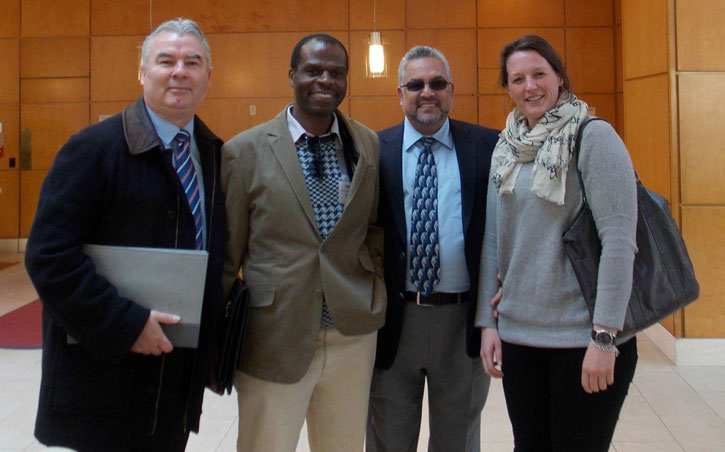The Child and Adolescent Mental Health (CAMHS) Task Force have been providing leadership and direction to achieve the National Mental Health Strategy goals over the past 12 months. The service is at a pivotal stage in the development of a community-based outpatient and day program service, and is also looking to support the management of children and young people who require a period of intensive inpatient treatment.

Left to Right: HMC Program Manager for HMC/SickKids Partnership Peter Walsh, Director of Nursing for Mental Health at HMC Simon Nhleko, Acting Chief of Psychiatry at HMC Dr. Hazem Hashem and SickKids Project Coordinator Ailish Kilmartin
Picture taken by Dr. Zahra Al Mejali, Deputy Chief of Psychiatry at HMC
The prime objective of the CAMHS team visit to Toronto was to learn from international best practice in relation to models of service, inter-professional practice and facility design. The team visited a number of organizations:
- SickKids International Tele-Psychiatry Service
- SickKids Crisis Intervention Service and Eating Disorders Unit
- North York General Hospital
- The Centre for Addictions and Mental Health – numerous units
- Youthdale Treatment Center
- Holland Bloorview Children’s Rehabilitation Center
The team also had the opportunity to attend a day seminar on ‘Brain Basics’ which show cased the latest research in brain function and its impact on mental health
Each organization that the team visited has its own service model but, within the Greater Toronto Area (GTA), the overall system operates on a ‘hub and spoke model’ with patients requiring very specialist treatment being referred in to services within the center of Toronto, either through an outpatient, emergency or crisis intervention route.
North York General Hospital provides child and adolescent mental health services for a designated population in the suburbs of Toronto. This includes outpatient services, inpatient services for children and adolescents with severe mental health problems up to the age of 19 – including eating disorders, designated day hospital programs and an Urgent Care Clinic, which provides urgent assessment, within 72 hours, for children and teenagers in crisis.
The Hospital for Sick Children (SickKids) is located in downtown Toronto and provides secondary and tertiary pediatric care to Toronto, the GTA, and the Province of Ontario and, for very specialized services, the rest of Canada and other countries all around the world. Mental health services for children and young people are located, organizationally, in the Center for Brain and Behavior and are quite specialized with a significant focus on the research and educational role that SickKids plays within the area of pediatric care. The Psychiatry Assessment and Treatment Unit (PATU) is an inter-disciplinary program providing specialized assessment and treatment in outpatient, day hospital and inpatient settings, for children and adolescents with psychoses, severe mood or anxiety disorders, or risk of suicide.
The Psychiatry Emergency and Crisis Service provides an urgent and acute care outpatient and consultative service for children and adolescents at risk of harming themselves or others, or who have other urgent psychiatric problems.
The Center for Addiction and Mental Health (CAMH) is located in downtown Toronto and occupies a large multi-building campus. Within the CAMH campus there are a whole range of inpatient, outpatient and day programs for all age groups and all levels of severity, including a detoxification unit and a level two medium secure unit.
Youthdale Treatment Center provides a very large program for children and young people with severe mental health problems who have mainly been in the care or criminal justice systems and cannot be managed in other settings. Youthdale provides a crisis hotline which receives between 5,000 and 7,000 calls a year and has two inpatient units of 10 beds each for patients with severe conditions and for transitional care – essentially a step down unit for patients no longer under a detention order. In addition they run community homes in Toronto and a residential ‘camp’ 200 miles north of Toronto which provides schooling and work placements.
The visit to Toronto provided a very useful framework on which the development of child and adolescent mental health services within HMC can be based.
